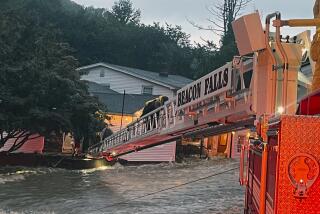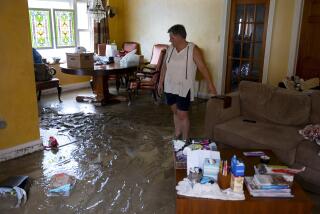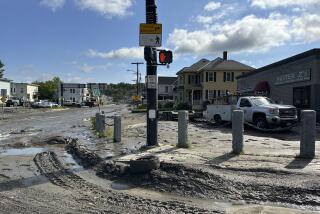Northeast blizzard eases; snowplows revved up for the big dig-out
BOSTON--The blizzard of 2013 began to ease somewhat Saturday as the Northeast began to slowly dig out from a fierce, and in some places, record-breaking storm that dropped more than 2 feet of snow and as much as 3 feet in some places.
The worst of the storm hit overnight Friday after an intense day of precipitation, whiteout conditions and howling winds that approached hurricane force. At least three deaths were attributed to the storm and more than 660,000 customers remained without electricity in eight states.
Despite the huge volume of snow, which could take days to clear out in hard-hit areas from Long Island to Connecticut, officials said they were relieved that the situation was not worse.
PHOTOS: Northeast buried in snow
[Updated 1:22 p.m. Feb. 9: At 4 p.m. Eastern time, Massachusetts officials lifted a statewide driving ban as more roadways were cleared. Subways and buses, however, were not yet running.]
“I’m happy to report the city so far has weathered the storm well,” Boston Mayor Tom Menino said at a news conference. “No major power outages, no severe flooding.”
“We still have a little way to go to get through the rest of the storm,” Menino said, urging Bostonians to check on the elderly and be careful while navigating the streets, clogged by more than 22 inches of snow.
New York Mayor Michael Bloomberg echoed that optimism.
“It looks like we’ve dodged a bullet,” Bloomberg said. “We were lucky.”
By Saturday afternoon, the storm had moved well into the upper New England area, forming a scimitar of blizzard conditions pointed toward Maine, where Gorham reported 32.9 inches. According to the National Weather Service, Connecticut reported six areas with more than 30 inches of snow; Milford led the list with 38 inches.
Connecticut Gov. Dannel P. Malloy closed all roads to regular traffic to clear the way for emergency vehicles, plows, and tow trucks needed to haul stranded vehicles out of the way.
“I would expect we’ll keep the travel ban in place through today,” Malloy said at a news conference. “So please stay home.”
The storm, a combination of a low-pressure area from the Midwest merging with a classic nor’easter, had been expected and officials took precautions earlier in the week. Snow-fighting resources were stockpiled, more than 5,300 flights were canceled, airports shut down and schools closed on Friday.
Airports, including those in New York, reopened to minimal operations by Saturday morning. Plows took to urban streets and road crews worked to restore power. Low-lying areas swamped by Hurricane Sandy last fall did not have new flooding as had been feared, though some coastal communities in Massachusetts and New Jersey were evacuated as a precaution.
In Boston, the snowfall began to slow by noon and the sun peeked out briefly as residents emerged from houses to shovel, snow blow and sled.
Jamison Haslam hooked a sled to his Bernese mountain dog, Oso, and pulled the sons of friend Jeff Brownlow through unplowed streets of Belmont, where 27 inches had fallen.
Brownlow, 28, who moved to the Boston area from Dallas two years ago, said he was excited to use his new snow blower and sleds. With the city’s driving ban still in effect, and public transit shut down, Brownlow and his family have largely stayed inside.
“It’s good to have something shut down everything and cause family time,” he said. “We need more of it.”
For Bostonians who had been huddled inside, watching the snow, the storm’s cessation meant that it was time to get out and face the snow drifts -- a prospect few relished.
“The two or three days after the storm are the ones that I really dread,” said Katharine Oates, a technology manager who lives in Somerville and who recently moved to the Boston area from Mexico. Her car was buried, snow drifts were high and Oates knew she’d have to start shoveling soon. She was expected back at work Monday, after all.
“It looks beautiful outside -- as long as you don’t have to do anything,” she said.
There were 412,000 power outages reported in Massachusetts, about two-thirds of all of the power problems reported to the federal Department of Energy. In Rhode Island, one of five states to declare an emergency, 185,000 customers were without power.
In all, Massachusetts, Rhode Island, New Hampshire, Connecticut and New York declared states of emergency.
New York City was spared the worst of the storm. A total of 11.4 inches fell in Central Park, and other parts of the city had smaller amounts. Road crews were out from Friday afternoon through Saturday morning plowing roads, Bloomberg told reporters.
Areas north and east of New York City weren’t so lucky. In Long Island’s Suffolk County, officials called out the National Guard to help dozens of people whose cars became stuck in snow drifts as they tried to get home Friday night after the snow began falling. Motorists were taken to nearby shelters to ride out the storm, and no casualties were reported.
Near a large shopping mall in Smithtown on Long Island, about 40 miles east of New York City, firefighters helped people from cars that got stuck in snow overnight after drivers hit hours-long traffic backups as they left work early. Motorists had either been unable to open doors that were frozen shut or concerned about leaving their vehicles during the snowfall. Firefighters pried open the doors and walked them back to emergency vehicles, where they were warmed up and taken to warming stations.
One elderly woman said she became stuck while driving home from work on Friday afternoon. She was accompanied by a younger man who had been stranded in the vehicle with her.
“The cars in front of us were getting stuck in the intersections. So the snow just started accumulating and that was it. Here we are 10 hours, 12 hours later,” he told the local ABC affiliate, which happened upon the scene. Both the man and woman said they were fine. They did not give their names.
Accumulations on Long Island ranged from a few inches to more than 30 inches, and the far eastern end of the Island continued to see some snow early Saturday. At the height of the storm, 35,000 customers on Long Island were without power; by Saturday, 10,000 remained without power.
Two deaths in New York state were attributed to the snow. A man was hit by a car in Poughkeepsie, north of New York City, by a driver who lost control in the snow. In upstate New York, state police said a man died when his snow-plowing tractor went over the edge of a roadway.
“This state had consequences, but nothing like our neighboring states,” New York Gov. Andrew Cuomo said Saturday, adding that New York would be sending plows and personnel to Connecticut and Massachusetts to help their recovery.”They were hit much harder,” he said.
New York Mayor Bloomberg, at a briefing Saturday, said all the city’s main roads and highways were clear, and subway and bus service were nearly normal.
The third death was reported in Connecticut. Gov. Malloy said an 81-year-old woman who was using a snow blower was hit by a car that did not stop.
Malloy said there had been about 1,600 calls to state police in the last 24 hours for help, including some for hypothermia after motorists were trapped in their cars by the snow. More than 400 National Guard troops were deployed statewide, and more were on the way to help with the digging-out, which Malloy noted won’t be quick.
“This will not all be done today,” he said.
Alana.Semuels@latimes.com
Tina.Susman@latimes.com
Michael. Muskal@latimes.com
Semuels reported from Boston, Susman from New York and Muskal from Los Angeles.
More to Read
Sign up for Essential California
The most important California stories and recommendations in your inbox every morning.
You may occasionally receive promotional content from the Los Angeles Times.













